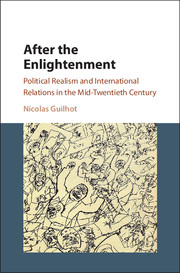After the Enlightenment
After the Enlightenment is the first attempt at understanding modern political realism as a historical phenomenon. Realism is not an eternal wisdom inherited from Thucydides, Machiavelli or Hobbes, but a twentieth-century phenomenon rooted in the interwar years, the collapse of the Weimar Republic, and the transfer of ideas between Continental Europe and the United States. The book provides the first intellectual history of the rise of realism in America, as it informed policy and academic circles after 1945. It breaks through the narrow confines of the discipline of international relations and resituates realism within the crisis of American liberalism. Realism provided a new framework for foreign policy thinking and transformed the nature of American democracy. This book sheds light on the emergence of 'rational choice' as a new paradigm for political decision-making and speaks to the current revival in realism in international affairs.
- Proposes an entirely new understanding of international relations theory and its history
- Will appeal to all students of international relations, but also to disciplinary historians and more generally intellectual historians
- Examines the appearance of 'rational choice' as a new paradigm for political decision making and will speak to the current revival realism in international affairs
Reviews & endorsements
'[Guilhot] is masterful in his descriptions of ideas within realism, and how they are connected to the roots and development of the theory. His analysis of the evolution of the concept of 'security dilemma' is fascinating, and he digs up the classical Christian roots of early theorists. He argues that Herbert Butterfield provides sociological justifications of human predicament and that the eastern and western blocs avoided war because each was unsure of the others' intention, as each was 'beset by the devils of fear'. The book is a compelling read for anyone interested in the history of theory.' Sumantra Maitra, International Affairs
Product details
April 2017Hardback
9781107169739
264 pages
235 × 157 × 20 mm
0.5kg
Available
Table of Contents
- Introduction
- 1. The realist gambit - or the end of political science
- 2. American katechon: Christian realism and the theological foundations of international relations theory
- 3. The making of the realist tradition: Felix Gilbert and the reclaiming of Machiavelli
- 4. The Kuhning of reason: political realism and decision-making after Thomas Kuhn
- 5. Cyborg pantocrator: at the origins of neorealism
- 6. The Americanization of realism: Kenneth Waltz, the security dilemma and the problem of decision-making.






